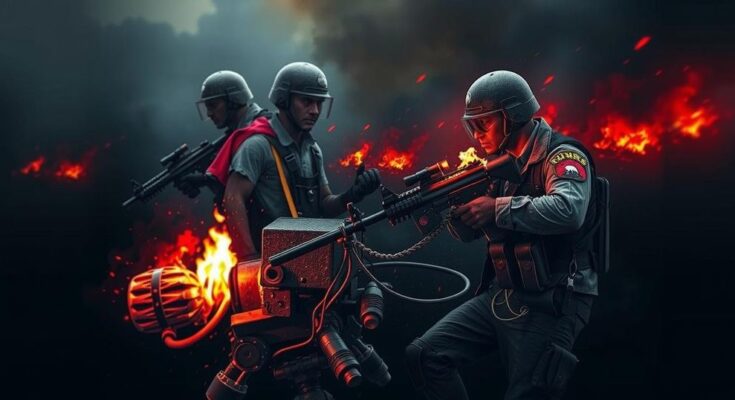Rebel forces in Syria have taken advantage of the weakened position of President Assad’s allies, capturing Aleppo and shifting control in the region. As Iran, Hezbollah, and Russia deal with their own crises, opposition groups have launched a surprise offensive that underscores the vulnerabilities in Assad’s coalition, suggesting a significant change in the war’s dynamics.
In a significant turn of events during the ongoing Syrian civil war, opposition forces have capitalized on the weakened state of President Bashar al-Assad’s support base. Allies such as Iran, Hezbollah, and Russia have been diverted by their own challenges, allowing rebel groups to launch a surprise offensive that resulted in the capture of Aleppo, a major Syrian city. Analysts note that this assault underscores vulnerabilities in Assad’s once formidable coalition, as foreign backing has diminished considerably over time.
Historically, the Syrian government had maintained a steady grip on power with the robust assistance of its allies. However, recent developments have transformed the dynamics of the conflict. Iran has faced mounting losses and an ongoing economic crisis, while Hezbollah has been strained by its engagements with Israel. Meanwhile, Russia’s involvement has waned due to its preoccupation with the war in Ukraine, forcing it to shift attention and resources away from supporting Assad’s regime.
Remarkably, within just a few days, rebel forces have seized significant territory that had long remained unchanged on the battle front. This rapid advancement was not entirely anticipated by the rebels, who had dedicated considerable time to training and planning their campaign. The disarray among Assad’s allies is attributed to their distractions in regional conflicts, most notably Hezbollah’s recent agreement to a ceasefire with Israel, which allowed the rebels to press forward while they were unprepared.
Moreover, domestic issues within Syria, including economic stagnation and a lack of popular support for the Assad regime, contributed to the weakened military response against the advancing rebels. Amid growing disenchantment among soldiers, many young conscripts opted to abandon their posts rather than face the organized and aggressive rebel offensive outside their territories.
This transformative moment indicates a significant shift in the Syrian conflict’s balance of power, with external influences and internal weaknesses aligning in favor of the opposition forces. As the rebels continue to build their military capacity and exploit geopolitical shifts, factors such as Turkey’s apparent change of stance on supporting opposition efforts may further complicate the situation in Syria.
The Syrian civil war has evolved dramatically since its inception thirteen years ago, transitioning from peaceful protests to a protracted armed conflict involving multiple factions and foreign powers. Previously, President Assad’s regime was bolstered by strong support from Iran, Hezbollah, and Russia, which provided military, economic, and logistical assistance aimed at suppressing rebel advances. However, as these allies have faced their own respective challenges, including military losses and geopolitical distractions, the balance of power has shifted significantly, providing an opening for opposition forces to reclaim territory and enhance their operational capabilities. This article analyzes the recent developments surrounding rebel offensives and the ramifications of changing alliances during a critical phase of the war.
In conclusion, the recent success of Syrian rebels in capturing substantial territory highlights the vulnerabilities of President Assad’s regime, primarily due to diminished support from key allies. As Iran and Hezbollah grapple with their own conflicts, and Russia reallocates its resources in the wake of its war in Ukraine, opposition forces have successfully exploited this precarious situation. The implications of these developments signal a potentially transformative chapter in the Syrian civil war, characterized by a significant shift in military dynamics and foreign support that could redefine future engagements and the overall trajectory of the conflict.
Original Source: www.nytimes.com




